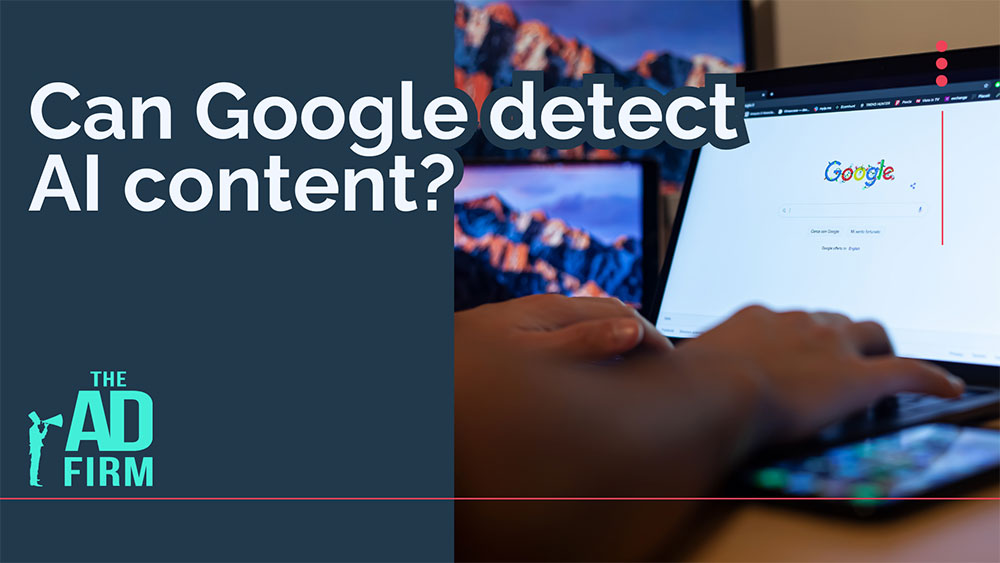When it comes to digital content, there is one thing you should be aware of – the line between content made by people and by AI is getting thinner day by day.
As the demand for AI content continues to grow, people have been more curious and cautious about whether Google can detect AI-generated content and whether it can cause a problem they wouldn’t be able to solve. The feeling is warranted because, at the core of SEO, ensuring the content won’t get penalized to retain its visibility is crucial.
Today, we’re diving deep into this topic, answering whether Google can spot AI-generated content and what that means for people or businesses making content online.
The Rise of AI in Content Creation
While AI tools for content creation have only been around for a few years, they immediately became a cornerstone of content production for their swift and transformative seamlessness. As AI content generation tools offer stability, efficiency, and scalability, people have been riding on this revolutionary tech trend to its maximum. But how does AI content creation exactly work?
Overview of AI-Generated Content
In a nutshell, AI-generated content came from a highly sophisticated algorithm and a vast dataset that aims to mimic and surpass what humans can do in crafting content like blog posts, listicles, web content, and complete narratives at a pace and volume unattainable by human creators alone.
AI content leverages natural language processing (NLP) and machine learning (ML) to replicate existing styles and, in some instances, innovate within the confines of learned patterns. The capacity of AI to generate content that resonates with human readers has been a game-changer. Yet, it also prompts a deeper examination of what constitutes creativity and originality in the digital era.
The Impact of AI-Generated Content
Without a doubt, the presence of AI-generated content has brought the following significant advantages:
- Speed and Efficiency: AI dramatically reduces the time required to produce content, meeting the ever-growing demand for fresh, engaging digital narratives.
- Scalability: The ability of AI to generate vast amounts of content unlocks new possibilities for content strategies, particularly for businesses looking to expand their digital footprint quickly.
However, in the grand scheme of things, the presence of AI-generated content is multifaceted, as it also presents a complex blend of challenges:
- Quality vs. Quantity: The efficiency of AI in producing content raises questions about the depth, engagement, and overall quality of these AI-generated pieces. There’s a risk that the digital space becomes saturated with content that lacks the nuanced understanding and emotional depth that human writers bring.
- Ethical Dilemmas: The use of AI in content creation blurs the lines between original thought and algorithmically generated output, raising ethical questions about plagiarism and the ownership of AI-generated content.
Both factors must be considered when understanding the full scope of AI content.
Google’s Stance on AI Content
Google’s stance on AI-generated content dictates how people who create content online do their processes and strategies. This is unsurprising since content creators and digital marketing services worldwide rely heavily on Google’s policies and algorithms about the quality and authenticity of content. In simpler terms, Google’s stance on AI content is crucial.
Google’s Official Position on AI-Generated Articles
Contrary to some beliefs, Google has made it clear that its primary concern is the quality and value of the content it can provide users rather than its origin. For context, Google’s guideline explicitly states that content should be designed to help users by providing accurate, relevant, and valuable information.
And what does this mean? It suggests that AI-generated content is manageable if it meets Google’s strict guidelines on quality standards. However, it is essential to note that Google’s sophisticated algorithms and guidelines are continually updated, so it is vital to stay updated with all of Google’s variables.
The Importance of Quality and User Experience in AI Content
To give you a general overview of how Google identifies what makes content valuable, you need to understand the content’s ability to serve the user’s needs effectively, marked by several key attributes:
- Comprehensiveness: Content should cover its topics thoroughly, offering users a one-stop solution to their inquiries.
- Reliability: The information must be accurate and trustworthy, underpinned by verifiable sources or evident expertise.
- User Engagement: Beyond being informative, content must be presented engagingly, capturing and retaining the reader’s interest and encouraging deeper interaction with the material.
These criteria underscore Google’s user-centric approach, asserting that high-quality content – whether produced by AI or human intellect – must foremost cater to and enhance the user experience.
Soooo – Can Google Really Detect AI Content?
The quick answer to this question is YES! Regardless of its accuracy, Google can indeed detect AI-generated content. This tech giant employs various mechanisms to sift through content that might have AI-generated content on it. Their algorithm is committed to ensuring that all content on their platform is of the highest quality, relevant to what people usually search for, and catered for a better user experience.
The challenge for each content creator and digital marketing agency utilizing AI to create content online is ensuring their output is original, informative, and finely tuned to human readers’ needs, aligning with Google’s stringent quality guidelines. Google’s algorithm and guidelines also update frequently, so knowing its latest trends and updates is imperative to dominate the search engine effectively and adequately.
Google’s Mechanisms for Detecting AI-Generated Content
The truth is that Google’s mechanism for detecting AI-generated content is not explicitly available to the public eye – but we’ve got some clues about how they might be doing it. Google uses a mix of cutting-edge algorithms, machine learning, and a massive database of web content to evaluate what’s real, what’s not, and what’s somewhere in between.
Analyzing Content Authenticity and Uniqueness
As someone who creates content online, you should know Google has a few tricks up its sleeve when figuring out whether content is authentic and unique. As Google’s algorithm expands its knowledge, it consistently improves at picking up on the weirdly perfect sentence structures and repetitive patterns that can signal AI’s handiwork. This means that if your content is simply a carbon copy of what you get from an AI tool, Google will notice it.
To counter this, you must blend AI-generated content with a touch of originality and authenticity. Ensure that you do manual editing and create more added value that comes out of your own mind.
The Role of Advanced Algorithms in Content Evaluation
Think of it this way – Google’s algorithms are like a Swiss Army knife for content assessment, slicing and dicing data to determine what makes content tick. This highly advanced algorithm can track how users interact with content, from how long they consume around it to whether they bounce right off the page.
Additionally, when it comes to content evaluation, Google’s algorithm usually favors content that resonates well with user experience and content that genuinely knows their stuff. The essence of Google’s algorithm is to spot the many content gems among the rough – this includes checking out AI-generated stuff that works well and doesn’t hit the mark.
Machine Learning’s Contribution to Identifying Synthetic Text
One of Google’s most recent secret mechanisms for detecting AI-generated content is its machine-learning algorithm. Why, you might ask? Well, it gets smarter every day at spotting the telltale signs of AI. It can literally tell how well your AI-generated content flows and blends with a human touch.
Plus, Google’s an extensive treasure trove of data that can compare your content against AI-generated ones, helping it spot the difference between human genius and AI’s best effort. So, no matter how you flip things, it will be detected as an AI if your content doesn’t add value to your user experience and just a straight-up copy of an AI result.
The Impact of AI-Generated Content on Google’s SEO
As AI-generated content continues to rise at an unimaginable level, its impact on SEO, where your content lands in search engines, becomes more evident to the naked eye. AI’s presence in crafting content shook up SEO strategies to its core. And for those of you looking to stay ahead of the curve, understanding how AI content plays with Google’s algorithms is critical to keeping our content visible and relevant.
How AI Content Influences Search Engine Rankings
From a bigger perspective, there are numerous ways in which AI content influences search engine rankings. But to name a few and to be more specific, here’s how it really weighs in with Google:
Quality always Best Quantity: Sure, AI can pump out content at warp speed, but Google’s all about the quality. It’s looking for content that answers questions, provides value, and keeps users – coming back for more.
Freshness and Innovation: AI has the potential to bring new ideas to the table, refreshing stale topics with new insights. Google eats this up, rewarding content that can give users a fresh take.
User Engagement: Content that gets users to stick around, dive more deeply, and interact positively impacts rankings. AI-generated content that nails user engagement is gold.
E-A-T: Expertise, Authoritativeness, and Trustworthiness are Google’s holy grail. AI-generated content needs to show it knows its stuff, is a reliable source, and can be trusted.
Keeping these factors in mind can be the wild card for your content to dominate the multifaceted needs for your SEO services.
Adjusting SEO Strategies for AI-Generated Content
It goes without saying that as Google’s mechanism and guidelines for AI-generated content continue to evolve, you must adjust your SEO strategy for using AI-generated content accordingly. While there are various strategies you can incorporate, the crucial thing to do is blend AI’s efficiency with a human touch to ensure content not only ranks well but resonates with readers.
This implies that your SEO strategies for AI content should be about keeping its quality and maintaining how engaging and informative it is for the readers. Your strategy should always aim for the human connection that AI won’t be able to replicate on its own.
The Future of AI Content in SEO Practices
Considering all the factors we have, it is highly likely that the future of AI content in SEO practices will revolve around blending AI efficiency and human creativity. This approach ensures that the content you make adheres to Google’s algorithms, and you can assure yourself that your content can take ranking spots for visibility.
Remember that the goal for future-proof SEO practices for AI content is always to utilize AI as a helping tool, not a crutch where we rely on everything. You must ensure that the content you create is as human as it gets, even if it has a bit of AI behind it. And, of course, relying on a reliable SEO company can help you streamline all the complex processes.
Creating AI Content That Aligns with Google’s Guidelines
Using AI in content creation is like a tightrope where you find the balance between creating content that aligns with Google’s guidelines but excels. With AI, It’s about tickling Google’s guidelines by ensuring your AI content is still authentic, engaging, and, most importantly, valuable to the reader. Below are some of the technical tips and strategies you can use:
Strategies for Blending AI with Human Oversight
The perfect strategy for blending AI with human intelligence is by doing the following:
- Emphasize Human Editing: AI can draft content, but human editors are crucial for adding depth and nuance and ensuring the content connects on a human level.
- Value Addition is Key: Use AI for data analysis and initial drafts, focusing on enriching the content with unique insights or perspectives.
- Incorporate User Feedback: User engagement can offer direct insights into refining AI content strategies to meet audience needs better.
- Stay Informed on SEO Trends: Keeping up with SEO best practices ensures that AI-generated content remains optimized and relevant.
Tips for Maintaining Originality and Adding Value
Let’s face it: AI-generated content is more present on the internet than ever. And for your content to stand out, you must commit to originality and provide genuine value:
- Use AI for Comprehensive Research: AI tools can unearth trending and timeless topics, ensuring your content is rich and informative.
- Boost Readability and Engagement: AI can help analyze and improve content readability, making it more accessible and engaging.
- Diversify Content Types: Mixing AI-generated text with human-made visuals and interactive elements can enrich the user experience.
- Commit to Ethical AI Use: Transparency about AI’s role in content creation and adherence to ethical standards ensures credibility and trustworthiness.
Adhering to these strategies and tips will significantly increase your chance of getting on the good side of Google’s guidelines and algorithm.
Final Thoughts
When all is said and done, what AI and content creation are about revolves around the idea that AI serves as a complement to human creativity, not a replacement. There is nothing wrong with embracing AI in content creation as long as we use it as a helping tool, not some all-cure medium where that solves everything.
By embracing AI responsibly and harnessing its potential in harmony with human insight and creativity, we can create content that meets Google’s evolving standards and elevates the digital discourse. The journey involves exploration, innovation, and a commitment to crafting content that resonates deeply with our shared human experience.









